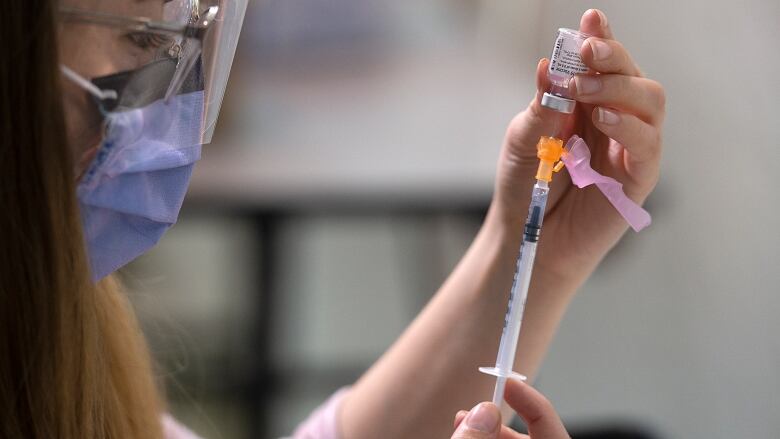Northern Sask. First Nation helps get COVID-19 vaccines into arms of non-Indigenous people
Lac La Ronge Indian Band saw surge in demand from non-Indigenous people during recent drive-thru clinic

Non-Indigenous people in northern Saskatchewan were able to get their COVID-19 vaccinations at a drive-thru clinic run by the Lac La Ronge Indian Band last week, amid what people in the area say are limited pharmacy appointments and a gap in government-run clinics.
Chief Tammy Cook-Searson said the band operated the clinic on Wednesday and vaccinated 80 non-Indigenous people and 123 band members.
She said the band was happy to provide the shots to non-Indigenous people, but was worried that doing so might deplete the supply for its own members.
"What if we run out, was our concern. Then we don't have any when our band members are ready to get vaccinated, because we do have some vaccine hesitancy among our band members."
Cook-Searson said public health nurses started calling during the drive-thru clinic to let her know that a lot of people lining up for shots weren't Indigenous.
"We were happy to see so many people and that it was successful," she said.
"We just wanted to make sure that the vaccines that we were administering were going to be replaced."
The government of Saskatchewan signed an agreement this spring to provide 14 per cent of its vaccine allotment to Indigenous Services Canada. The agreement was aimed at ensuring vaccine supply to on-reserve communities and included a further allotment to compensate for off-reserve members returning home for their vaccination.
Cook-Searson said she made some calls to the government to see if they would replace the vaccines that were given out to non-Indigenous people so the band wasn't left short.
"They were willing to help us out."
Cook-Searson said the Lac La Ronge Indian Band will hold a joint clinic with the Saskatchewan Health Authorityon June 21, National Indigenous Peoples Day.
"It's for the health and safety of all of our community members and their family members."
Too much reliance on pharmacies
La Ronge pharmacist Matt Preston said the Lac La Ronge band has been integral to administering second COVID-19 vaccine doses in the north.
But he said the Saskatchewan Health Authorityhas dropped the ball and offloaded too much responsibility onto individual pharmacies and First Nations for administering second COVID doses.
"We don't have the capacity to actually handle that in this region,'' Preston said.
"That might work somewhere like Saskatoon or Regina, where you have a couple of thousand pharmacies. It doesn't work in centres like this."
Preston said his pharmacy is only able to administer 10 COVID vaccinations daily.
That's because with only two pharmacists on staff, a business to run and medications to dispense they can't handle any more.
He's turning away as many as 90 eligible people each day who phone searching for a COVID vaccine appointment.
"To get the first doses done required an army of people. It is a little bit shortsighted to say that army of people can now go back to doing whatever else they were doing before this and the pharmacies are just going to somehow fill in the gaps," he said.
"Well, we don't have an army of people here."
Spokesperson Doug Dahl said the Saskatchewan Health Authorityhas held vaccine clinics in La Ronge, Pinehouse, Sandy Bay and Creighton in the past three weeks.
He said the next clinic in the area will be on June 19.
In an emailed statement, Dahl said the health authority also operated school clinics to vaccinate children 12 and older and offered any unused vaccine up to community members for first doses.












_(720p).jpg)


 OFFICIAL HD MUSIC VIDEO.jpg)
.jpg)



























































































